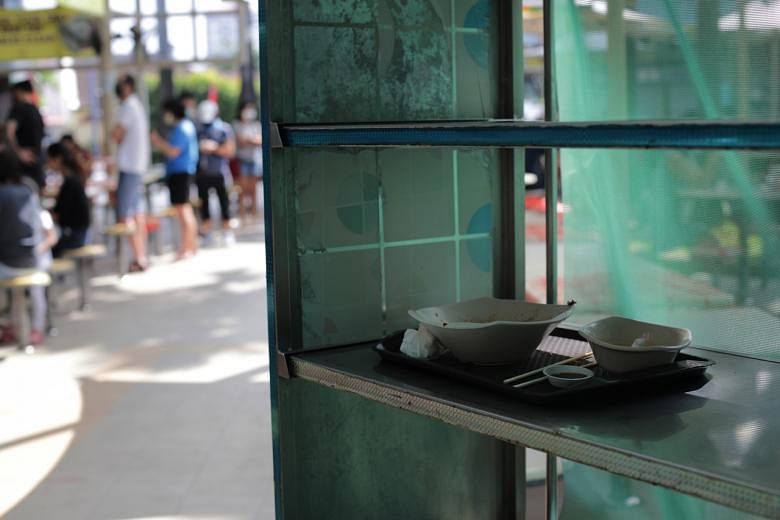SINGAPORE - A regime to clean up and disinfect public spaces will be rolled out progressively, targeting more than 2,000 high-risk premises such as pre-schools, schools, youth facilities and eldercare facilities from July, as part of Singapore's efforts to enhance public hygiene to ward off future outbreaks of infectious diseases.
The initial phase, which also includes hawker centres and coffee shops, has a targeted completion date by the end of this financial year, said Senior Minister of State for Sustainability and the Environment Amy Khor on Thursday (March 4).
Pointing to gastroenteritis incidents affecting more than 1,200 people in 2018 and 2019, and the low satisfaction levels of public cleanliness in places like markets and coffee shops, Dr Khor said that the "battle is far from over", with more to be done to shore up public health defences.
Following the passing of the Environmental Public Health (Amendment) Bill to introduce mandatory baseline sanitation standards, premises will be required to implement an environmental sanitation regime for the cleanliness of their premises.
Environmental control coordinators will be appointed to assist in developing and implementing the regime.
Such staff - who should preferably hold supervisory roles at the premises they work in - must undergo training by SkillsFuture Singapore accredited providers which will be available from this month, said Dr Khor.
More than 2,000 environmental control coordinators will be trained from this month, and eligible participants in the course will receive up to about 90 per cent in course fee subsidy, she added.
These coordinators will receive more guidance on disinfection regimes from a new technical guide by the National Environment Agency (NEA) - a unit under Dr Khor's ministry.
This guide, which will be available from Thursday, will set out the national minimum standards for improving environmental sanitation in high-risk areas.
This provides premise owners with information on what to do and look out for when performing their routines in periodic cleaning and disinfection, and in incidents involving bodily fluids and discharge.
Even before Covid-19 brought home the importance of hygiene, earlier lapses had resulted in death and illness.
Lapses in food hygiene at Spize restaurant in 2018 caused an acute outbreak of food poisoning, killing a father of two and landing 46 people in hospital.
Just last year amid the Covid-19 pandemic, there was also an outbreak of salmonella and stomach flu in a pre-school in Newton, affecting 68 children.
The guide can be customised to develop sector-specific standards, such as for eldercare facilities, added Dr Khor.
Disinfection guidance
The technical guide also includes advice on daily cleaning frequencies for high-touch surfaces and toilets, and prescribed periodic cleaning for hard-to-reach areas, pest management plans and the necessary equipment and cleaning agents required to carry out effective cleaning and disinfection.
Sector-specific standards will be rolled out progressively from mid-2021.
Sessions have also been conducted with operators of specified premises such as pre-schools and hawker centres to gather more in-depth feedback on how to better tailor standards to the respective premises.
The staggered roll-out will provide premise owners with more time to prepare for their new cleaning workflow, and to send their staff for training to be environmental control coordinators, who will assist in developing and implementing the programme.
Enhancing the environmental services industry
NEA will also look to enhancing professionalism, productivity and and standards of the environmental services strategy through outcome-based contracting model and the use of technology.
To "futureproof" businesses beyond Covid-19, one of the ways would be to move away from headcount-based contracts, and focus instead on outcomes, said Dr Khor.
She noted that the Government has taken the lead by requiring outcome-based contracting for new cleaning contracts since May last year.
"This ensures clear outcomes for service buyers and encourage cleaning companies to innovate and be more productive, which in turn creates better jobs and addresses manpower constraints," she said.
To ensure that this remains relevant and useful to service buyers, the NEA will a refresh the outcome-based contracting guide for cleaning services this month.
This includes an easier method to measure service outcomes, and sample contract clauses which cater for contingencies such as Covid-19, to offer flexibility in adapting to changing requirements, noted Dr Khor.
In addition, the NEA will further promote the adoption of outcome-based contracting by consulting the pest management sector and facility management companies to develop a set of guidelines for pest management contracts, as these are often task and frequency-based, such as the fogging of premises once a week.
The guide is expected to be ready by the end of the year.
Singapore is also beefing up its hygiene on other fronts by championing initiatives to raise productivity and enhance jobs in the environmental services industry.
As at Feb 17, the Productivity Solutions Grants has committed $28 million and approved 1,290 applications for 458 companies in the cleaning, waste and pest management sectors.
The grant, which came into effect in April last year, provides funding support for companies which are adopting solutions to increase their operational efficiency and productivity, as well as to upskill their staff.
Companies can be supported for up to 80 per cent of their qualifying cost, capped at $350,000 until Sept 30.
Efforts to ensure that jobs in the industry are attractive and have a long runway also include the progressive wage model, which will be extended to waste management workers.
The Tripartite Cluster for Waste Management will develop job ladders, training requirements and wage benchmarks for these workers.












